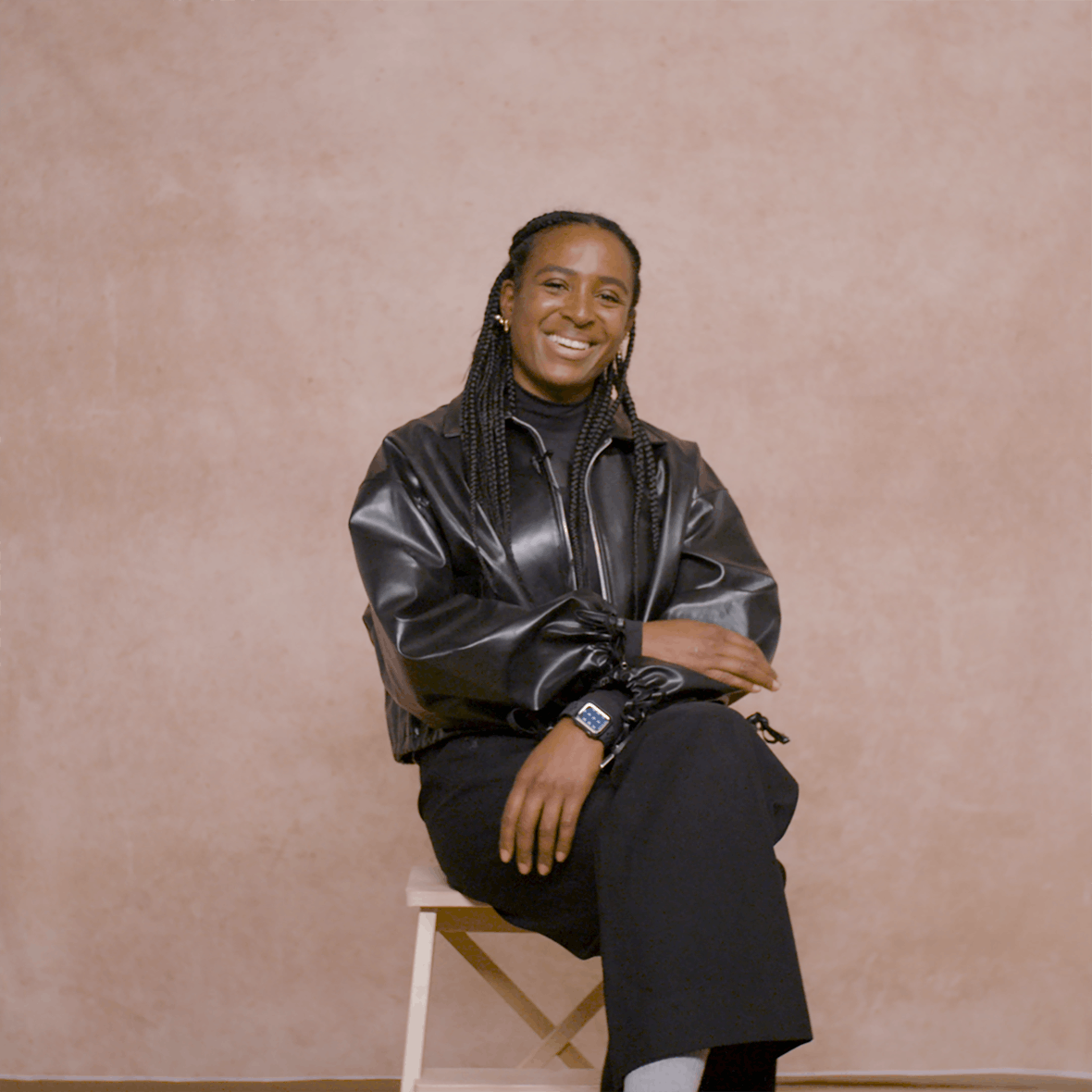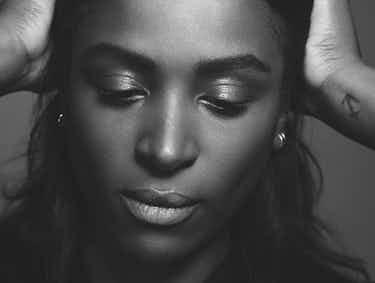Cyndia Harvey: “Joy is seeing Black people receiving their flowers”

The Jamaican-born hairstylist earned her stripes championing inclusivity in the fashion industry. Now, she’s a BFC Changemakers Prize finalist.
Beauty
Words: Jessica Morgan
Cyndia Harvey is one of the most exciting hair stylists of her generation, having worked with world-famous names such as FKA twigs, Naomi Campbell and Frank Ocean. So it comes as no surprise that, last week, the 34-year old was named as a finalist for the British Fashion Council’s Changemaker Prize (in partnership with Swarovski) for championing the underrepresented through more inclusive beauty in editorials, campaigns and films.
Harvey, who was born in Jamaica and moved to London aged 11, first learned to style hair from her mother, who was a hairdresser. Aged 18, she began her career working at a London hair salon, focusing on afro hair before getting the opportunity to work backstage with industry legend Sam McKnight. Soon after, she became McKnight’s first assistant, working with him exclusively on shoots, campaigns and runway shows. After five years of honing her craft, she’d carved a name for herself as one of the most impressive hairstylists in the game.
Her vision for inclusive beauty has landed her collaborations with some of the world’s most renowned photographers, like Tim Walker and Alasdair McLellan, as well as brands like Jacquemus, Loewe, Gucci, Louis Vuitton, Miu Miu and more.
In 2017, Harvey released a short film, This Hair Of Mine, a visual commentary on the way in which traditional African hairstyling connects women via lineage and tradition across the globe. “I wanted to show Black women how beautiful we are,” she told The Cut at the time.

Cyndia, a HUGE congratulations on being named a finalist for the British Fashion Council Changemakers Prize. I’m keeping my fingers and toes crossed for you to win.
I’m incredibly humbled and honoured.
I admire your modesty. You’ve had a really impressive career so far. I must ask: why hair?
That’s a very good question. I was thinking about this when the finalists were announced. Why do I do what I do and how did I come to do this and get this honour? Well, actually, hair has always been the place I could escape to. I really enjoyed my own company and I really lived in my head as a child. I started doing hair because my mother was a hairdresser and it was something I picked up. We didn’t have Barbies or dolls in Jamaica where I grew up, so I made my own out of rocks. I made hair sculptures and put them on these rocks I drew faces on, or I would kidnap my friends and do their hair for hours. I didn’t really think too much about it, other than [the fact that] it made me escape from the situation I was in. Aged 17, I was stressed and I knew I had to make a decision: I could go down one path that was destructive, or remember that there is this thing here that I enjoy that allows me to escape – and that was hair. So I enrolled in a hair course. I didn’t really have this big dream, it was something I did to survive. But I’ve worked hard and I’m passionate about what I do, and that pays off.
Do you have a favourite hairstyle?
My favourite hairstyle was when I had no hair [laughs]. Having no hair was really easy and it’s a proper low-key hairstyle. Outside of work, I’m not consumed by hair at all. The last thing I want to do at work is think about what hairstyle I’m going to wear. Having a strong line between work and home-life is really important. Boundaries are important. I did that thing where I worked continuously non-stop and it was all consuming. I didn’t think about anyone else, didn’t hang out with friends, and I realised it doesn’t make you happy that way.
CYNDIA HARVEY
Self-care is important. What were the most helpful things you learnt working with Sam McKnight?
He did say to me once, ‘Cyndia, you really need to be more cheerful even if you’re tired’ [laughs]. Now, every time I’m tired and grumpy at work, I think of that.
Haha, you can’t hide your expressions!
What can I say, I’m Jamaican! Jokes aside, I learnt so many incredible lessons from Sam. He’s this legend who has had a career spanning three decades. When people ask me what my career highlights are, I always feel that’s a premature question to ask because a career is about longevity. I’m still in my infancy. So just being around someone like that [McKnight] for so long, who has managed to produce and create excellence for such a long time while still keeping people engaged and interested, was a massive lesson.
You have been such a champion for inclusivity. What changes have you seen since you started in the industry?
Thank you. That’s such a big question [laughs]. I think one of the biggest changes I’ve seen is when I made This Hair Of Mine. I expressed that I wanted to do more projects like it. There was some nervousness around this because people thought I was going to be ‘typecast’. The mainstream industry sees Blackness as a niche and so my film, which was created for and targeted to that demographic, put fear in people. People were more concerned about whether I was palatable to clients, because all of a sudden I had created this “Very Black Project” and clients may not want to work with me because I’m too Black, basically. So one of the changes I’ve seen is being given a fair chance and not being pigeonholed. The biggest change will be when we no longer need to have this conversation.
When I first started out, there were hardly any Black artists at agencies. There may have been one at each agency and people felt that there was space for only one Black person. But things have changed. I want to continue seeing what we’re seeing now. There are so many talented people of colour and I feel so excited to see everyone. It’s a real collective and it feels great to be part of that.
What brings you joy and excitement at work?
There was a point after those comments, a few years ago, when I was feeling really disheartened after a few things were said to me after making This Hair Of Mine. But what brings me joy is seeing someone like yourself at THE FACE, Ib Kamara [at Dazed] and Carlos [at i‑D]. All of these amazing and incredibly uniquely talented individuals are being recognised the way they deserve to be. That gets me really excited, especially when I get to work with them.
I came up during a time, and recent times might I add, when I was one of the only Black people in the room. Now, it’s really exciting hearing all the different stories that are coming out. There are so many people from various cultures and backgrounds, and it’s not just one story being told.
We all outchea! So, what are your thoughts on the new rule that all hairstylists must learn to cut and style afro hair, and how will it impact independent Black salons?
I honestly haven’t given this much thought, but my immediate reaction was – and I feel like we’re mates so I can say this – I don’t care. But now that I’ve thought about it, I do think it’s positive. I understand your question about how it will impact Black hair salons – it will impact community spirit around Black hair, because it’s a very different experience going into a European salon versus a Black hair salon.
However, the new rule will mean that any person will be able to walk into any hair salon and feel welcomed. I don’t think this will push out local salons, because people go to salons for so many different reasons. Some people go for that keke, some go to actually get their hair done, some chill and spend all day there, and others want to get their hair done quickly.
One time I needed to colour these kinky hair extensions for an actress. The colourist I was using at the time said she didn’t think she could do it because she doesn’t colour Black hair. I was like, these are just fucking curly extensions. So I think these rules will be great because no matter what you specialise in, whether it’s colour, styling or cutting, if a Black person walks into your salon, you’ll be able to do it because you know how to. There’s no excuses.
If there was an artist – past or present – that you’d love to work with it, who would it be and why?
I would have loved to have done Prince’s hair back in the day. Obviously, out of every celebrity, I’d say Rihanna. I don’t even want to do her hair, I just want to hang out with her. Let’s manifest it.
“I think it’s a really exciting time for young artists because the rule book has been thrown out of the window”
CYNDIA HARVEY
What’s your favourite memory of getting your hair done?
I don’t have one, but I do really, really, really love getting my hair washed. It’s everything from the water to the massage, I just love people touching my head. I don’t want a personal trainer or a chef, I want a personal hair washer!
I’ve never heard anyone say that before, but let’s manifest it for you. What advice would you give young people hoping to follow in your footsteps?
You have to really want to do this. 90 per cent of what it’s projected to be isn’t what it is. It’s not always glamorous and it’s not always that glossy picture you see on Instagram. You have to work really hard and only passion gets you through those moments.
I think it’s a really exciting time for young people and artists coming up, because the rule book has been thrown out of the window. I had quite a traditional career, assisting for a certain amount of years with a big iconic hairstylist, then being taken on by an agent. Now, there’s so much opportunity to create a space for yourself because of the internet. Putting in hours into perfecting your craft remains crucial.
UP next

